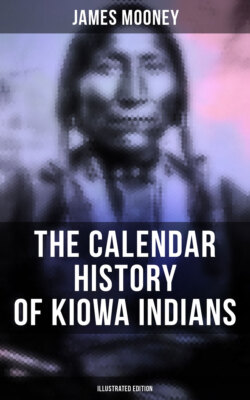Читать книгу The Calendar History of Kiowa Indians (Illustrated Edition) - James Mooney - Страница 49
На сайте Литреса книга снята с продажи.
Defiant Speech of Dohásän
ОглавлениеTable of Contents
On one occasion, during the distribution of the annuity goods on the Arkansas, when fifteen hundred lodges of Cheyenne, Arapaho, Comanche, Kiowa, and Apache were encamped along the river, the agent took the opportunity to tell the Kiowa as plainly as possible that if they did not cease their depredations the government would not only withhold their presents but would send troops to punish them. The great chief Dohásän, after listening in respectful silence to the end, sprang to his feet, and, calling the attention of the agent to the hundreds of tipis in the valley below, replied in a characteristic speech:
The white chief is a fool. He is a coward. His heart is small—not larger than a pebble stone. His men are not strong—too few to contend against my warriors. They are women. There are three chiefs—the white chief, the Spanish chief, and myself. The Spanish chief and myself are men. We do bad toward each other sometimes, stealing horses and taking scalps, but we do not get mad and act the fool. The white chief is a child, and like a child gets mad quick. When my young men, to keep their women and children from starving, take from the white man passing through our country, killing and driving away our buffalo, a cup of sugar or coffee, the white chief is angry and threatens to send his soldiers. I have looked for them a long time, but they have not come. He is a coward. His heart is a woman's. I have spoken. Tell the great chief what I have said (Report, 7).
